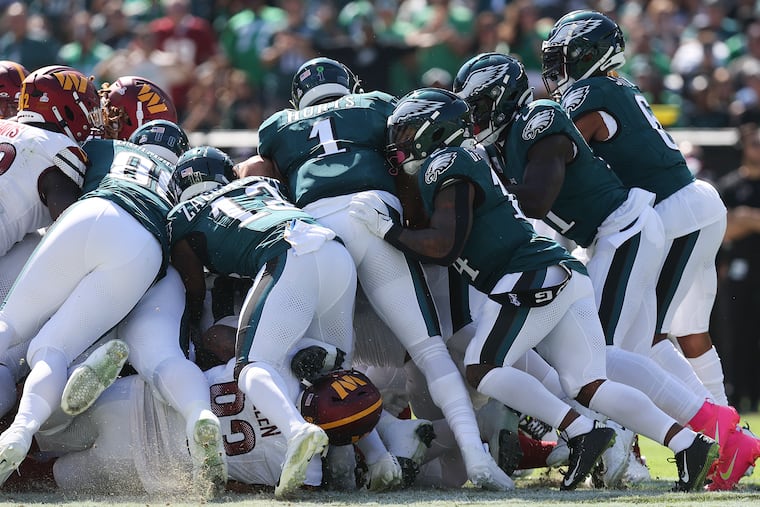Eagles’ Jason Kelce is taking the ‘Brotherly Shove’ pushback as a compliment
Complaints are piling up, copycat plays are failing, and the league apparently is scrutinizing the Eagles' quarterback sneak play.

In the NFL play-calling world, imitation is only one form of flattery.
The Eagles’ rendition of the quarterback sneak, colloquially known as the “tush push” or the “Brotherly Shove” for the boost that quarterback Jalen Hurts receives from behind, has been successful on all but one of their attempts this season. Offenses around the league have tried to adopt the play with varied results, the latest failure coming from the New York Giants in their 24-3 loss to the Seattle Seahawks on Monday.
But for center Jason Kelce, the complaints and questions from opposing teams — the tush pushback, if you will — are just as complimentary as the copycat attempts from other offenses.
“We’re really successful at it,” Kelce said Wednesday before practice. “So obviously, teams are doing everything they can to try and stop it and replicate it. It’s a sign that we’re doing something right when people are complaining about it.”
» READ MORE: The NFL needs to ban the Eagles’ ‘Tush Push.’ It’s hurting too many people’s feelings.
Officiating crews are keeping a watchful eye on the Eagles’ execution of the play, too. Kelce revealed on his New Heights podcast with his brother, Kansas City Chiefs tight end Travis Kelce, on Wednesday that the Eagles received a warning before Sunday’s game against the Washington Commanders that left guard Landon Dickerson has lined up in the neutral zone on past sneaks. The center is the only player allowed in the neutral zone because he’s snapping the ball.
When the Eagles went to run the play against the Commanders in the second quarter on fourth-and-1, Dickerson was called offside because his hand seemingly was in the neutral zone. The Eagles offense moved back 5 yards, bringing the punt team on the field.
However, Kelce claimed on the podcast that the hand in question was his, not Dickerson’s, because Kelce was in a four-point stance. Kelce asserted that the officiating crew messed up the call. Dickerson, meanwhile, downplayed any frustration that might have lingered.
“I talked to the officials,” Dickerson said. “I know there was something a couple of weeks ago about my hand placement, where they want, on the ball. I asked them, ‘Where can my hands be in relation?’ And they told me behind that back tip of the ball. So I placed my hand behind the back tip of the ball.
“They call what they call. It is what it is. You can complain about that. I’m sure people complain about calls for other teams we play. It’s football. Some could argue there’s probably a penalty on every play, but it just depends on what the referees are seeing and assessing.”
Coach Nick Sirianni echoed a similar sentiment, emphasizing that the Eagles can only focus on what they can control on the play. They can’t control how opponents line up against them — for example, when Commanders defensive tackle Daron Payne appeared to situate his hand under the ball on the same play that Dickerson incurred a flag — and whether officials are calling offside penalties on the defense.
“We have to make sure that we don’t leave any doubt on the field that we’re legal during that play,” Sirianni said. “Like Jason said, there was an emphasis on that this week. I’m not here to argue whether I thought the call was right or wrong on that.”
Sirianni added, jokingly, “Well, you know I’m always going to think that we’re right.”
Kelce also said on his podcast that the Eagles might not have been successful on the second-quarter sneak even if Dickerson hadn’t been called for offside. He has found this season that opposing defenses generally are getting better at defending the play, including the Commanders. Kelce tipped his cap to Commanders defensive coordinator Jack Del Rio, who said earlier in the week that he’d like to see the play eliminated because he doesn’t view it as a “football play.”
But even though the Eagles were foiled once on Sunday, they went back to their trusty “tush push” in the third quarter on third-and-1 and in overtime on fourth-and-1, converting on both occasions.
Imitation may be one form of flattery, but Kelce said he “kind of” gets a kick out of watching other teams fail at pulling off the Eagles’ iteration of the sneak.
“You always want it to work,” Kelce said. “I think it should work if it’s done properly.”
Other offenses around the league are trying to adopt the play for themselves, but they don’t have a Hurts, a Kelce, or the rest of the Eagles offensive line to make it go.